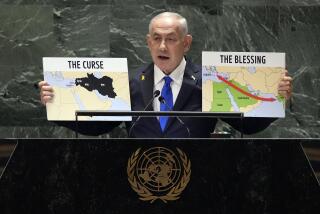Trump makes little headway in his first turn on U.N. world stage
Reporting from United Nations — President Trump won accolades from Israeli Prime Minister Benjamin Netanyahu but otherwise made more diplomatic waves than progress in his first appearance at the United Nations General Assembly this week.
The presidents of Japan and South Korea welcomed Trump’s announcement of new sanctions against North Korea but privately questioned whether his threat to “totally destroy” the country would lead to the diplomacy they prefer.
Arab and Iranian leaders sat stone-faced during Trump’s bellicose address Tuesday — while several other world leaders reacted with bemusement, chagrin and confusion to his often-contradictory comments.
Netanyahu could be observed laughing and grinning as Trump described the hard-fought international nuclear accord with Iran as the “worst deal ever” and an “embarrassment” to the United States.
Far from taming his enemies, Trump seems to have inflamed tensions further as the world faces a nuclear-armed North Korea and worries about a deal designed to prevent Iran from building a bomb.
South Korea’s Yonhap News Agency reported Thursday night that North Korea’s foreign minister, Ri Yong Ho, said in New York that his country may test a hydrogen bomb in the Pacific Ocean to fulfill leader Kim Jong Un’s vow to take the “highest-level” action.
The Partial Nuclear Test Ban Treaty, which the United States and the Soviet Union signed in 1963, forbade atmospheric and underwater testing of nuclear weapons. No confirmed ocean tests have occurred since then, but North Korea is not a signatory.
North Korea conducted an underground test of what it called a hydrogen bomb on Sept. 3. An ocean test could severely damage the environment as well as expand the security crisis.
In recent months, Kim’s government has launched its first intercontinental ballistic missiles, tested its most powerful nuclear bomb and launched two midrange ballistic missiles over northern Japan. It threatened to fire multiple missiles into the ocean off Guam but did not do so.
The U.N. Security Council responded by voting unanimously on two occasions to impose sanctions on North Korea’s imports of oil and its exports of coal, textiles and seafood.
Trump issued new U.S. sanctions as well that would penalize other nations, foreign companies or individuals who do business with North Korea.
Iran also responded to Trump’s comments with its own escalation. It unveiled a new ballistic missile at a military parade in Tehran.
The Khorramshahr missile has a range of nearly 1,250 miles and can carry multiple warheads, according to Tasnim, a semiofficial news agency. It thus has the range to target Israel and Saudi Arabia.
“We will promote our defensive and military power as much as we deem necessary,” Iranian President Hassan Rouhani said at the parade, according to Tasnim. “We seek no one’s permission to defend our land.”
He added, “Whether you like it or not, we are going to help Syria, Yemen and Palestine, and we will strengthen our missiles.”
Rouhani’s comments, broadcast on the anniversary of Iraq’s 1980 invasion of Iran, appeared aimed at Trump and his harsh comments at the U.N.
During the weeklong General Assembly, Trump, invoking his reality-TV flair for drama, said he had made a decision on whether to walk away from the Iranian deal, but he would not yet reveal it.
His administration recently continued lifting sanctions against Iran, which was part of the agreement. But next month, Trump must issue a separate certification to Congress on whether Iran is complying with the deal, an every-90-day requirement under U.S. law.
Several administration officials have suggested Trump will not certify compliance even though the U.N.’s nuclear watchdog, the International Atomic Energy Agency, has found Iran in compliance eight times since the deal was signed in 2015.
U.S. Ambassador to the U.N. Nikki Haley and Secretary of State Rex Tillerson say they want to judge Iran on its broader behavior, including support for militant groups across the Middle East, even though that was not part of the nuclear deal.
Trump has continued his outreach to leaders of Israel, the Palestinian Authority and other Middle East regions in hopes of restarting peace talks.
“Obviously a good deal of work remains to be done, but discussions remain serious and constructive,” Brian Hook, the State Department’s director of policy planning, told reporters.
Trump’s meetings with Jordan’s King Abdullah II and Palestinian Authority President Mahmoud Abbas produced verbal niceties but no apparent movement.
In his speech, Abbas demanded a renewed U.S. commitment to a two-state solution, something Trump has resisted although it’s been part of U.S. policy for a generation.
Abbas said his people demand equal rights with Israelis.
“This is not a threat, but a warning of the realities before us as a result of ongoing Israeli policies that are gravely undermining the two-state solution,” Abbas said.
On the plus side, U.S. officials said they were pleased that 130 nations had agreed on the need to reform U.N. operations, as Trump has demanded. The unwieldy bureaucracy has been dogged by scandals involving finances and sexual abuses by U.N. peacekeeping troops.
Tillerson had said he would bring a smaller-than-usual delegation to the U.N. But some diplomats said the message, not the number of diplomats, was a problem.
“You could have had a thousand diplomats, but what [the administration] was trying to sell was hard to market,” said Aaron David Miller, a Middle East expert who spent 24 years as a U.S. diplomat.
For more on international affairs, follow @TracyKWilkinson on Twitter
More to Read
Sign up for Essential California
The most important California stories and recommendations in your inbox every morning.
You may occasionally receive promotional content from the Los Angeles Times.











